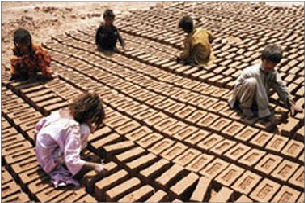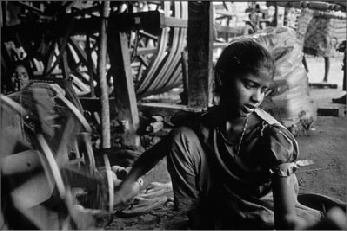As dawn breaks in Narikudi in rural Tamil Nadu, the fields are already busy, filled with shadowy figures bent double planting the rice. Many people here work for 12 hours a day farming the land, chopping wood or making bricks, often parents are forced to send their daughters to work to supplement their families’ meager income. Although condemned by the international community, child labor is commonplace in Tamil Nadu and many girls work in hazardous conditions.
Many Indian familes live in continuous distress, rarely finding any solution to their hardship. Daughters, who are in some cases regarded as little more than property, are then introduced to bonded labor, forfeiting their chance of an education. The children of the affected families in the Narikudi block dropout of school because their families need them to contribute financially. Children may also go to other states in India to work in industries (such as sweet making) which is hazardous and they kept there as bonded laborers.
Many girls forced into child labor in the nearby match industries or brick chambers. The adolescent girls are pushed into the Sumangali Plan where they earn money to pay their own marriage dowry. They are sometimes sent to work in the textile industries in Coimbatore, Erode, Tirupur, Palladam, Vellakoil and Karur in Tamilnadu.
Under this Sumangali Plan these girls are housed within the textile factories, under conditions seemingly like a mini jail. Agents select girls to work at these factories for a 6 month trial. After this period the best workers are employed as cheap child labor and the rest of girls are returned to the village without any pay. The selected girls are contracted for 18 hours a day to work for 3 years, to supplement their families’ income and save for their marriage dowry, whilst being subjected to the sexual harassment and exploitation of labor.
Their wage is their food and board, they are promised a Rs.36000 (less than 595 euro or $763 USD) lump sum at the end of the 3 years. But in the recent years most of the girls have been dismissed just prior to the 3 year period ending up with no payment at all or just given invalid bank cheques by some of the companies.
Working conditions for girls are even worse than those of their male counterparts, and many are treated little better than slaves. Many are subjected to sexual harassment which can leave permanent physical and mental scars. South Indian women, particularly those in disadvantaged areas are not only pressured into raising money for their dowries, but also have to perform all the household duties. As a result, it is common for families not to see the value of education for their daughters.
Please sponsor now!

